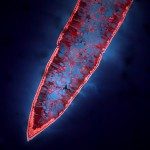Link to Pubmed [PMID] – 26091878
Schizophr. Res. 2015 Jun;
Schizophrenia is a debilitating syndrome with high heritability. Genomic studies reveal more than a hundred genetic variants, largely nonspecific and of small effect size, and not accounting for its high heritability. De novo mutations are one mechanism whereby disease related alleles may be introduced into the population, although these have not been leveraged to explore the disease in general samples. This paper describes a framework to find high impact genes for schizophrenia. This study consists of two different datasets. First, whole exome sequencing was conducted to identify disruptive de novo mutations in 14 complete parent-offspring trios with sporadic schizophrenia from Jerusalem, which identified 5 sporadic cases with de novo gene mutations in 5 different genes (PTPRG, TGM5, SLC39A13, BTK, CDKN3). Next, targeted exome capture of these genes was conducted in 48 well-characterized, unrelated, ethnically diverse schizophrenia cases, recruited and characterized by the same research team in New York (NY sample), which demonstrated extremely rare and potentially damaging variants in three of the five genes (MAF<0.01) in 12/48 cases (25%); including PTPRG (5 cases), SCL39A13 (4 cases) and TGM5 (4 cases), a higher number than usually identified by whole exome sequencing. Cases differed in cognition and illness features based on which mutation-enriched gene they carried. Functional de novo mutations in protein-interaction domains in sporadic schizophrenia can illuminate risk genes that increase the propensity to develop schizophrenia across ethnicities.


